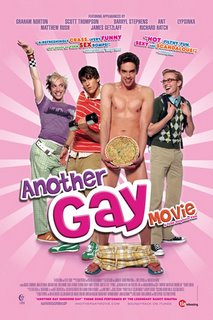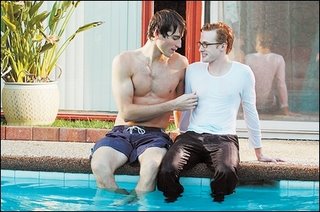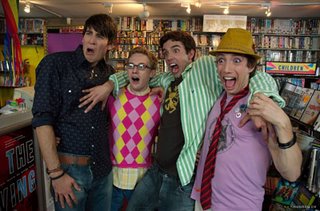Last summer, I self-published a treaty bemoaning the recent trends in Queer cinema. The Advocate had just announced the arrival of the 'New New Queer Cinema' and I was working on a video installation which forced me to examine the closing minutes of every Queer film made since the turn of this century. A slew of feigned, saccharine joissance and sub-porn production qualities. The marvelous narrative trends of the 'New Queer Cinema' (which B. Ruby Rich famously quipped as being 'Homo Pomo[Postmodern]') were giving way to a more cathartic drive towards self affirmation. The Hallmarkization of Queer cinema, perhaps.
And yet, the figureheads of these straight-to-DVD vehicles were not the spectatorial figure who echoed the arthouse viewer of the New Queer Cinema (NQC), but instead the Muscleman, who would not only illicit an erotic want in the renter from his pose on the box cover(a desire more equated to the consumption of pornography became affixed to these listless melodramas), but signaled a narrative alientation. No longer could the viewer physically relate to the figure with whom he was intended to empathize. The relationship instead became based in physical desire as contrast (or, in some way, complimented - as the pretty pill is always the easiest to swallow) to emotional fulfillment, though the narrative cues might confuse from this dynamic. And so an equation was forged where the viewer, typically older than those figures whom he may watch, finds emotional comfort in the film's sentimental narrative drive whilst facing alienation in the chasm between the his (real) self and the picture's (idyllic) subjects.
When I penned these backlash blues, none of the films which touted this new and ill-conceived moniker of New New Queer Cinema had been widely distributed. I had yet to endure Eating Out, the particular picture which excited The Advocate as much to earn the new movement cover feature attention. And though it is my aim here to discuss another film, Eating Out is certainly a vulgar piece of self hatred and abjectification deserving of its own lambasting. But not today. Today, Another Gay Movie gets that attention.
 Functioning under the pretext of Teen Sex Comedy, a friend casually attempted to dissuade me from looking too deeply into this foolish romp because of its intention as slight: a symptom of its Genre-ness. But I recall seeing Clueless in theaters, and because of its frivolity, I clung to more moments than I had to any other "serious" film prior. Comedies are cathartic affirmations of social trends. Though parodic, they are also great legitimizers of those prevalent societal stereotypes they purport to ridicule. So, to follow the example of Clueless, when Amber uses her fingers to spell the 'W' of her 'Whatever,' we laugh, but might repeatedly use that same symbol later in jest. In a performative sense, we appropriate the ridiculous elements of her affectation. The dangers in Another Gay Movie are quite great.
Functioning under the pretext of Teen Sex Comedy, a friend casually attempted to dissuade me from looking too deeply into this foolish romp because of its intention as slight: a symptom of its Genre-ness. But I recall seeing Clueless in theaters, and because of its frivolity, I clung to more moments than I had to any other "serious" film prior. Comedies are cathartic affirmations of social trends. Though parodic, they are also great legitimizers of those prevalent societal stereotypes they purport to ridicule. So, to follow the example of Clueless, when Amber uses her fingers to spell the 'W' of her 'Whatever,' we laugh, but might repeatedly use that same symbol later in jest. In a performative sense, we appropriate the ridiculous elements of her affectation. The dangers in Another Gay Movie are quite great.
The mentality of Another Gay Movie is profoundly adolescent, yet the film is primarily patronized by middle-aged homosexual men. A trip to the Virgin Megastore in West Hollywood (a primarily 30 and 40-something gay community in Los Angeles) will find it ranked high upon the best-sellers shelf. The parallel becomes nausteatingly clear while watching the film - gays are the new teens. That shouldn't come as any great surprise. The same music blares in Gay dance clubs as can be found on Teen pop stations. The competitive high school import placed on appearance is rivaled only by the gay community's obsession with gym bunnies, designers and hairdressers. Throughout the course of the film, as we watch our four protagonists try for the anal run-in they so hungrily desire, the shallow disregard for all things not steeped in sexuality should frighten, but seldom does a quiet moment pass to pause and regard the more cautious undertones which casually lurk below its low-budget surface.
Furthermore, those typical roles of character which can be traced through the history of Queer film (Ephebe, Muscleman, Spectator - see Thomas Waugh's "The Third Body") are horrifically distilled down to the basest of stereotypes. No figure, not a one of our four primary protagonists is ever graced with the benefit of characterization, more frequently resembling a member of the Luney Tunes than any living, breathing creature. I was reminded of some shade thrown by Miss Lindsay Lohan in Mean Girls, the type of film Another Gay Movie so desperately tries to be. She describes one gay character as "too gay to function." You can't quite picture one of these teens doing anything as rote as taking out the trash. One might imagine it would become a voguing montage. Sustenance, too, becomes an endless source of erotic stimulation throughout the film's trim 90 minutes. In any average high school, a figure like Nico (pictured above with Survivor's Richard Hatch) would be stomped into the ground. Or, more poignantly, his flamboyance would have stemmed from his persecution. But direct representations of opposition is something mysteriously absent in Another Gay Movie's homoverse.
 No, the oppositional pressure lies elsewhere, in a far more covert corner of the room. The normative shadow of an all gay phantasty world is something which should not be taken lightly - for when Queerness... or rather Gayness (there is a great distinction) becomes the only singular norm, what is its opposite? Countering does not exist solely as a diminutive function of society, and the understanding of such binary roles is fundamental to understand both ends' functions in the culture in question. Women are the only non-gay figures in the film and they are either (a) sources of physical humor(and thus reaffirming homosexuality's inherent misogyny), (b) subjects of sexual maleability (at the hands of our bafoonishly absurd bull-dyke) or (c) horror. They are, more importantly, aligned with our protagonists, as our gay teens don't see themselves as men - or boys even - but as a replacement for the female in a homosexual union. The film is, then structured as a heterosexual film, with its entire cast - rather than forming the sexual identity of the film - filling in as substitute to the absent ruling majority whose structure has been lazily appropriated, submitted to. Touted as a "Gay American Pie," the description is apt both in terms of its abject use of humor, but as well in its sexual politic.
No, the oppositional pressure lies elsewhere, in a far more covert corner of the room. The normative shadow of an all gay phantasty world is something which should not be taken lightly - for when Queerness... or rather Gayness (there is a great distinction) becomes the only singular norm, what is its opposite? Countering does not exist solely as a diminutive function of society, and the understanding of such binary roles is fundamental to understand both ends' functions in the culture in question. Women are the only non-gay figures in the film and they are either (a) sources of physical humor(and thus reaffirming homosexuality's inherent misogyny), (b) subjects of sexual maleability (at the hands of our bafoonishly absurd bull-dyke) or (c) horror. They are, more importantly, aligned with our protagonists, as our gay teens don't see themselves as men - or boys even - but as a replacement for the female in a homosexual union. The film is, then structured as a heterosexual film, with its entire cast - rather than forming the sexual identity of the film - filling in as substitute to the absent ruling majority whose structure has been lazily appropriated, submitted to. Touted as a "Gay American Pie," the description is apt both in terms of its abject use of humor, but as well in its sexual politic.
The film is also noteworthy for its endless barrage of degradation phantasies (and realities). This, I understand, is also true for American Pie, yet the function of abject subordination within the trajectory of Another Gay Movie is particularly disheartening. Staying true to my read of the film as heterosexist (if not merely heteronormative - which is worse?) the nerd character, Griff, at one point experiences a day dream where he assumes the role of Carrie (from the film of the same name) to enact the film's romantic, whirling-camera dance sequence with his costar/crush. As he/she mounts the stage, the camera locates the threatening bucket overhead, the cord of which is being kept by his narrative rival, Beau (for the hand/ass of his crush). He is depicted with the same hue of lipgloss as the original (female) character, Chris. These two males, in the pursuit of a(nother) male, don the garb of the opposite sex. Yet when Beau/Chris overturns the bucket to finally mortify Griff/Carrie, the original blood has been replaced with semen and Griff/Carrie screams, drenched in that which he yearns for. The sequence ends with Griff's awakening to find the phantasy a wet dream - sperm emitting from the top of his white briefs.
The abject, as elucidated by Julia Kristeva in The Powers of Horror, is the human reaction(typically a visceral expulsion) to the trauma a loss of distinction between subject and object (self and other) might arouse. These incidents of abjection take place when the our protagonists attempt to modify their bodies for the prospective sexual encounter. When Griff envisions himself Carrie and can no longer delineate his two personas, the result is a deluge of sperm. A like sequence is one in which the hunky protagonist Jarod vomits upon the bare bottom of his prospective conquest. He is intoxicated and a mixture of this drunkenness and his premature attempt at sexuality (when later he proves less regimentally fixed in his performative prowess as "top") causes enough of trauma to cease that which he so dearly desires. It can alternately be read as a symbolic punishment for desiring such pleasures/living an alternate lifestyle in contrast to the film's absent yet omnipresent sexual opposition.
All of this interpretation is, however, a read and the source never gives way to complications as such. The subtleties of obtuseness are still crippling however, and through all of these problematic interpretations I find Another Gay Movie's attitude towards the history of its own group to be the most disturbing. The only figure of the film to suppose any education as it pertains to the history of Queer community is by far the most ridiculed. Nico, the twinkie caricature, who is more than any other character, "too gay to function," is also the only one who can site those cultural icons Queerness once held so dear. His love for Liza, Madonna and Karen Black find him the butt of countless jokes. When he finally finds that individual to relinquish his virginity, it is not a peppy college boy, but an aged and matured daddy. The film finds nothing right with this, however and drapes the older gentleman in a cruise captain's hat and vibrant cabana clothing. The old queen, we are to understand, is as much deserving of ridicule as the little twink. During their seduction, Nico coos to him "If I called you worldly, polished and sophisticated, would you hold it against me?" This is a world where wisdom and learning are detriments. In this way, these attitudes are no less direct off-shoots from the above discussion of heteronormative tropes. Mainstream culture has certainly established its disdain for the education. But, as they perform within the allegedly "gay" narrative, these two characters' camping becomes - rather than the first codified method of discourse created by the modern homosexuals - a hollowed iteration of femininity. Lacking its subversive powers, it becomes little more than a fault. And faults, the film would have us think are the antithesis of Eros.
Similar, too, is the film's apparent disrespect (or perhaps, disinterest) for the plethora of Queer films from which Another Gay Movie derives the majority of its material. In slight references and direct scene recreations, the film is, like the Rainbow Video at which all of our protagonists seem to be in employ, a relative glossary of Queer cinema. As Nico unrolls the poster for Another director Todd Stephens prior Edge of Seventeen, he comments, "coming of age films are so passe bourgeois." Stephens restages a scene from his own prior effort - a sequence in which a boy comes out to his mother (who, here, is even portrayed by the same actress). But in this film, the originally complex and heartbreaking scene culminates in the mother's explosive delivery of a "Duh!!" Even stabs at Camp quips (like the endless references to Mommie Dearest) are, like the contemporary approach to Camp(which has so long ceased to be that which Sontag outlined in her famous "Notes on Camp"), stripped of their initial charge and land flat and smug. Of course, everyone in the room knows to laugh, but the fashioning of the safe "Camp" joke undermines Camp's codified power. History, rather than being a matrix from which to cull information, seems a graveyard, from which antiquities may be exhumed for the solitary purpose of parody.
 It is my understanding that the director wrote the screenplay as a vicious reaction to his producers' demands that his films be "more gay." The screenplay, which was intended as a snide gesture, was in fact produced. The film, however, lacks any strong satirical elements that might have made the film a searing statement about the state of contemporary Gay culture. There are precious few moments which unearth its absurdity (the sequence in which the mother emerges from the back of the video store toting burgers and sandwiches, dressed like Sharon Gless' character from Queer as Folk is spot on with the type of criticality it would see Stephens had intended to create en mass). The substitution of a quiche Lorraine for American Pie's apple pie could have been a telling parody of Gayness, but the film is too busy fingering the stuff, while sound effects of sloushing and sucking fill the gratuitous soundtrack, to bother considering for a moment the greater consequence of its actions.
It is my understanding that the director wrote the screenplay as a vicious reaction to his producers' demands that his films be "more gay." The screenplay, which was intended as a snide gesture, was in fact produced. The film, however, lacks any strong satirical elements that might have made the film a searing statement about the state of contemporary Gay culture. There are precious few moments which unearth its absurdity (the sequence in which the mother emerges from the back of the video store toting burgers and sandwiches, dressed like Sharon Gless' character from Queer as Folk is spot on with the type of criticality it would see Stephens had intended to create en mass). The substitution of a quiche Lorraine for American Pie's apple pie could have been a telling parody of Gayness, but the film is too busy fingering the stuff, while sound effects of sloushing and sucking fill the gratuitous soundtrack, to bother considering for a moment the greater consequence of its actions.
As a post-script, if this sort of thing is up your alley, shoot me an email and I'll send you Eaten Out: Cinematic Trends Towards Self-Obliteration part one.
Well, i liked it. Griff kinda looks like you.
ReplyDelete